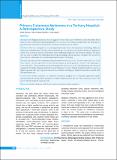Please use this identifier to cite or link to this item:
https://hdl.handle.net/20.500.14356/1104Full metadata record
| DC Field | Value | Language |
|---|---|---|
| dc.contributor.author | Sharma, Nisha | - |
| dc.contributor.author | Adhikari, Ram Chandra | - |
| dc.contributor.author | Sayami, Gita | - |
| dc.date.accessioned | 2023-04-24T06:20:33Z | - |
| dc.date.available | 2023-04-24T06:20:33Z | - |
| dc.date.issued | 2021 | - |
| dc.identifier.citation | SharmaN., AdhikariR. C., & SayamiG. (2021). Primary Cutaneous Melanoma in a Tertiary Hospital: A Retrospective Study. Journal of Nepal Health Research Council, 19(2), 300-304. https://doi.org/10.33314/jnhrc.v19i2.3086 | en_US |
| dc.identifier.issn | Print ISSN: 1727-5482; Online ISSN: 1999-6217 | - |
| dc.identifier.uri | http://103.69.126.140:8080/handle/20.500.14356/1104 | - |
| dc.description | Original Article | en_US |
| dc.description.abstract | Abstract Background: Malignant melanoma, the most aggressive form of skin cancer worldwide is much often talked about in the western world and in Caucasian population as it is seen to be a rare disease in South Asians. This study aims to provide a better assessment on the spectrum of cutaneous melanomas in our context. Methods: This was a retrospective, 11-year hospital-based study done in the Department of Pathology, Tribhuvan University Teaching Hospital. The data collected included age, sex, anatomical site, Breslow thickness in millimeter, Clark’s level of invasion, presence of ulceration, Tumor infiltrating lymphocytes and melanoma subtypes. The anova test was used to compare the relationship between age and staging, whereas pearson’s chi square test was used to determine the relationships of sex and histopathological subtype with staging. Results: Out of total, 44 cases of primary cutaneous melanoma were seen, 23 (52.27%) were males and 21 (47.27%) were females. The mean age was 61.29 year with the majority in the age groups 61–70 and 71-80 comprising 11 cases each (25%). Lower extremity was the most frequent site (23 cases, 52.27 %). The largest group (18 cases) was composed of Nodular melanoma, followed by acral melanoma (17 cases). Nodular melanoma tended to occur at a higher stage than other types. Age and sex showed no correlation with staging. A significant association was found with histopathological type. Conclusions: Primary melanoma is a commonly encountered malignancy. It is commomly appreciated equally among both gender among elderly populations. Nodular melanoma present late and is the commonest variety with lower extremity being the commonest site Keywords: Breslow thickness; clark’s level; cutaneous melanoma; nodular melanoma | en_US |
| dc.language.iso | en | en_US |
| dc.publisher | Nepal Health Research Council | en_US |
| dc.relation.ispartofseries | Apr-June, 2021;3086 | - |
| dc.subject | Breslow thickness | en_US |
| dc.subject | clark’s level | en_US |
| dc.subject | cutaneous melanoma | en_US |
| dc.subject | nodular melanoma | en_US |
| dc.title | Primary Cutaneous Melanoma in a Tertiary Hospital: A Retrospective Study | en_US |
| dc.type | Journal Article | en_US |
| local.journal.category | Original Article | - |
| Appears in Collections: | Vol. 19 No. 2 (2021): Vol 19 No 2 Issue 51 Apr-Jun 2021 | |
Files in This Item:
| File | Description | Size | Format | |
|---|---|---|---|---|
| 3086-Manuscript-23768-1-10-20210907.pdf | Fulltext Download | 284.82 kB | Adobe PDF |  View/Open |
Items in DSpace are protected by copyright, with all rights reserved, unless otherwise indicated.
